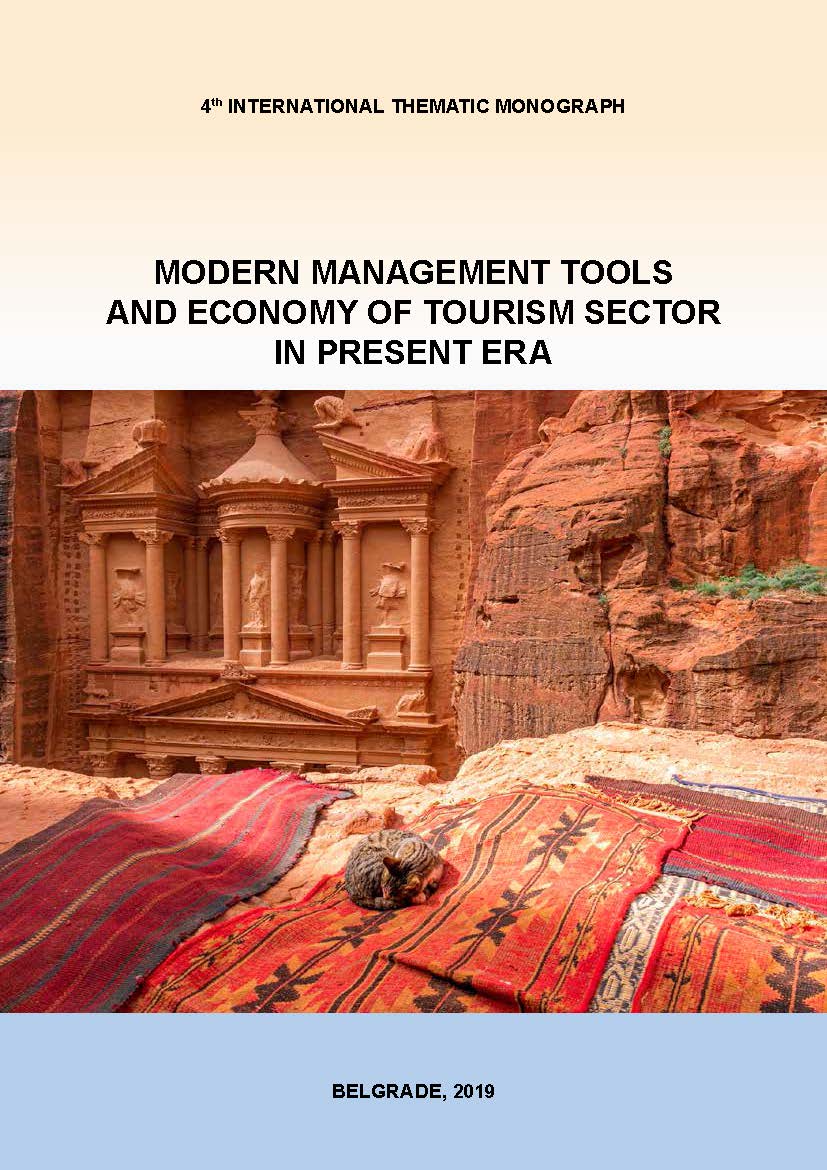|
ADVANTAGES, CHALLENGES AND WEAKNESSES OF SPA TOURISM IN SERBIA Goran Dašić Modern Business School – Terazije 27, 11000 Belgrade, Serbia Ana Anufrijev “Čačak” Business School, Higher Education Institution for Applied Studies, Gradski park 2, 11080 Belgrade, Serbia; Modern Business School, Terazije 27, 11000 Belgrade, Serbia Dragan Milačić “Čačak” Business School, Higher Education Institution for Applied Studies, Gradski park 2, 11080 Belgrade, Serbia DOI: https://doi.org/10.31410/tmt.2019.359 4th International Thematic Monograph - Modern Management Tools and Economy of Tourism Sector in Present Era, Belgrade, 2019, Published by: Association of Economists and Managers of the Balkans in cooperation with the Faculty of Tourism and Hospitality, Ohrid, North Macedonia; ISSN 2683-5673, ISBN 978-86-80194-29-5; Editors: Vuk Bevanda, associate professor, Faculty of Social Sciences, Belgrade, Serbia; Snežana Štetić, full time professor, The College of Tourism, Belgrade, Serbia, Printed by: SKRIPTA International, Belgrade
|
|
Abstract: Spa tourism services have recently reached a synergy of parameters that are bounded by commercial, traditional and therapeutic practices. Spa therapies have been present since ancient times through various forms, depending on the cultural, social and political environment they have existed in. The trend of connecting medicine and spa tourism is generally known and accepted, and as such it multiplies with the following contents: architecture, sustainable development, massage, spa and wellness, traditional and modern medicine. Serbia is rich in spas and, in recent times, has been working on revitalising spa tourism and improving its content. This chapter gives a structured overview of the current situation and shows the possible ways of further development with its advantages and difficulties, for later deeper analyses. Keywords: health tourism, spa tourism, spa destination, challenges. REFERENCES Anufrijev, A., Dašić, G. (2018) Challenges of spa tourism in the Republic of Serbia for the rehabilitation of Children with motor skills problems – Tourism in function of the development of the Republic of Serbia, Thematic Proceedings vol. II (pp. 714-731) Goodrich, J. N., & Goodrich, G. E. (1991). Health-care tourism. In S. Medlik (Ed.), Managing tourism Oxford: Butterworth-Heinemann. pp. 107 (pp. 107_114). (1989). UN Convention on the Rights of a Child Lunt, N., Smith, R., Exworthy M., Green, S. T., Horsfall, D. and Mannion, R. (2011) Medical Tourism: Treatments, Markets and Health System Implications: A scoping review, OECD - Directorate for Employment, Labour and Social Affairs, Paris. Muller, H., Kaufman, E. L. (2000). Wellness Tourism, Journal of Vacation Marketing, 7(1), pp 5-17. Smith, M. & Puczkó, L. (2009). Health and Wellness Tourism, Oxford: Butterworth-Heinemann Stanković, S., Priroda kao turistička vrednost Jugoslavije, Zbornik radova „Turistički potencijali Jugoslavije, Novi Sad, 15-16. November, 1996. Tabayashi, A. (2010). Regional Development owing to the Commodification of Rural Spaces in Japan, owing to the Commodification of Rural Spaces in Japan, Geographical Review of Japan Series B 82(2): pp. 103–125 The Law on Spas, Official Gazette of RS, No. 80/92, 67/93 Travel & Tourism Economic Impact 2017 (2017). World Travel & Tourism Council World Tourism Organization (UNWTO) - http://www2.unwto.org/en Vanhove, N. (2005). The Economics of Tourism Destinations, Elsevier Butterworth-Heinemann, Oxford.
| |||||||
Association of Economists and Managers of the Balkans
- UdEkoM Balkan -
179 Ustanicka St, 11000 Belgrade, Republic of Serbia
E-mail: [email protected]
www.udekom.org.rs
- UdEkoM Balkan -
179 Ustanicka St, 11000 Belgrade, Republic of Serbia
E-mail: [email protected]
www.udekom.org.rs
Tel. +381 62 812 5779
VAT number: 108747027
Registration number.: 28157347
Registration number.: 28157347


